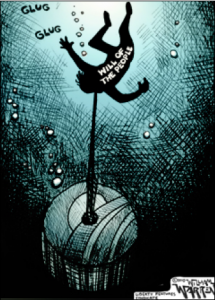
However, it seems this partisan line also stretches past the land of the U.S. and deep into its oceans.
In 2010, when President Obama passed his executive order “Stewardship of the Ocean, Our Coasts, and the Great Lakes,” he claimed it “strengthens ocean governance and coordination, establishes guiding principles for ocean management, and adopts a flexible framework for effective coastal and marine spatial planning to address conservation, economic activity, user conflict, and sustainable use of the ocean, our coasts and the Great Lakes.”
Not everyone agrees with his claim and now this oceans and lakes power play has sparked quite a partisan fight going into this election year.
Many Republicans see this Executive Order as nothing more than an absurd power grab by the Obama administration. To control the country’s lakes, oceans and coastlands by issuing strict usage regulations and restrictions will only hurt such livelihoods as farming, fishing and logging.
Many Democrats and environmental allies see this as a positive step forward that will protect the nation’s oceans and also limit the number of conflicts over how the waters are used.
The Washington Post cites a recent study where Boston University biologist Les Kaufman was a contributor. The study shows “that using ocean zoning to help design wind farms in Massachusetts Bay could prevent more than $1 million in losses to local fishery and whale-watching operators while allowing wind producers to reap $10 billion in added profits by placing the turbines in the best locations.”
Kaufman responds to the study saying, “The whole concept of national ocean policy is to maximize the benefit and minimize the damage. What’s not to love?”
Meanwhile, Florida Republican Rep. Steve Southerland II, who is in a tight reelection race, says this ocean policy was “like air traffic control helping coordinate an air invasion on our freedoms,” as quoted by the Washington Post.
Despite its lack of support from many Republican members of Congress, it is the process by which this policy was put into place—through Executive Order – that is most puzzling and troublesome to some.
In 2007, a similar bill was proposed in Congress, which at that time was controlled by Democrats in both chambers, called OCEANS-21. It would have established a comprehensive National Oceans Policy, very similar to what the president is working on today. The bill never became law. In spite of having an overwhelming partisan Democrat majority in his first two years in office, Obama chose to ignore the will of Congress altogether, by mandating the policy into existence with a overly broad use of his powers to issue an Executive Order—involving only a small team of White House staff.
As Rep. Southerland compares this ocean policy to a rogue traffic control operation, all would agree that traffic control is a good operation to have.
However, it is not an uncommon practice of government, when it is given a little jurisdiction, to take much more. This is exactly what concerns Rep. Doc Hastings (R-Wash.), the House Natural Resources Committee Chairman. The Washington Post summarizes his thoughts as not being opposed to a national ocean policy, per se, but concerned about the administration’s vague and broad definition of what “ocean” means exactly. If it includes runoff from land in its jurisdiction then it could open the door to regulating all inland activities, because “all water going downhill goes into the ocean… That potential could be there,” Rep. Hastings said.
Out of concern for the thousands of American jobs that rely on America’s Great Lakes and oceans, the House voted in May to block the federal government from spending money on implementing the policy, though the amendment has not passed the Senate.
In an interview with Americans for Limited Government (ALG) earlier this year, Jim Donofrio, executive director of the Recreational Fishing Alliance, took Chairman Hastings’ comments even farther and said that this ocean policy is nothing more than private property theft. “This is a government takeover of every piece of water that drains into the Atlantic, Pacific and Gulf of Mexico,” he says. “This is taking state’s rights away, land rights and personal property rights.”
As this ocean policy becomes a more contentious battle for various campaigns it could also become one for voters whose livelihoods could very well be impacted as this policy moves forward.
Bill Wilson, president ALG, expressed outrage at the decision voters are facing, “Law abiding Americans should not be forced to choose between their livelihoods and following an Executive Order that has not passed Congress and is not being funded by Congress. This is the ultimate thug government mentality that has become all too prevalent with this Administration.”
Will voters decide on Nov. 6 that this administration’s environmental policies, land and sea, have gone too far? America will have its answer soon.
Rebekah Rast is a contributing editor to Americans for Limited Government (ALG) and NetRightDaily.com. You can follow her on twitter at @RebekahRast.






